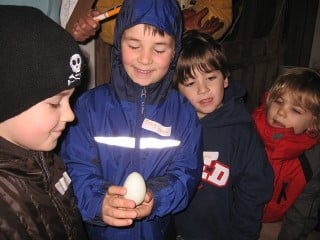Inquire Now T
Get FREE Registrations

4.5 /5 Star Rated Preschool in Yelp

Block playing offers an open-ended, creative, and valuable play and learning experience available to each setting. It offers children freedom to explore, take apart, and replace any block-based creation they will consider. There are several advantages to be gained from this activity. There’s a reason that building blocks are a number of the foremost familiar toys you’ll find in preschool classrooms. Twiddling with blocks provides a wide-ranging, versatile learning experience for young children. What exactly do young children learn during block play? Infant Care San Diego brings eight benefits of block play for preschoolers.
Through block playing, children are liberal to follow their ideas as they start a voyage of discovery or share within the development of their friends’ creations. Blocks aren’t inherently representative of building-like structures, albeit they’re often wont to construct models of them. This suggests children can imagine themselves to be whatever they need, encouraging creative play. Block playing supports children’s social-emotional development and teaches critical problem-solving, math, engineering, creativity, and more. Blocks provide excellent learning experiences in our classrooms, but they’re also an activity you’ll easily do. Just confirm your children have much space to create and be active!
Children are ready to express themselves through their play, creations, and discoveries, a sort of communication that’s particularly valuable for bilingual or non-verbal children. Representing yourself in any way should be a mandatory thing to do for all kids. It would help if you didn’t let your kids sulk in a corner because it negatively impacts their minds. Building blocks allow them to express their imagination, and they get a platform to represent their ideas. It is very similar to what social media does for us adults these days. We can write and create posts and stories according to what we think and imagine.
Blocks offer an excellent platform to develop problem-solving and reasoning skills. This will be deliberate, with children consciously working to create an answer, or as a natural consequence of play, as they learn first-hand what does and what doesn’t work. Building tall block towers takes patience, concentration, and a real deal of motor skills and coordination accuracy. Preschoolers find out how to work out exactly where they ought to place a block to stay a tower balanced, then use their hands to hold out that call. At Pre K San Diego, the teachers focus on kids playing blocks and do problem-solving questions.
Due to the various shapes, sizes, and hues on offer, blocks offer ample opportunity for youngsters to practice critical math skills, covering measurement, number, symmetry, balance, and estimation. By comparing shapes and sizes, creating patterns, or providing measuring and weighing tools, we will extend play and exploration. As previously mentioned, studies show that block play correlates with math achievement in grammar school. Children learn math concepts through block play, like sorting, counting, and symmetry, even in preschool. You’ll encourage children to undertake to count what percentage blocks are in their structure. They’ll also observe that one system is higher because it’s more blocks. Many children are learning concepts more or less at this age, and block play may be a great activity to strengthen such concepts.
Block play promotes the event of spatial awareness and develops hand-eye coordination as children reach for, lift, move and build with blocks, strengthening their fingers, hands, and arms. Since we all know how important physical development is for kids, playing blocks will promote it.
Blocks are loose parts, meaning children are liberal to combine and recombine them in countless ways. Practitioners can add alternative resources like dough, minor world characters, or paint and pencils to further extend opportunities for creativity. Building anything requires creativity. When your kid gets some blocks, all they have to do is put up their creative minds and create something liked by them.
By exploring cause and effect and experimentation, children are ready to develop their problem-solving skills, test hypotheses, and practice scientific reasoning. Blocks help them to become conversant in balance, weight, spatial awareness, and gravity.
Children can take risks in their block play, helping them to get that they need independent ideas. Children experience a way of accomplishment as they ‘have a go’, creating and developing something new and unique. Block play may be an excellent way to support preschoolers’ social-emotional development, as this is often the age once they are learning how to play with others. Having children work together to create an enormous block city or zoo (or whatever they ideate) may be an excellent way to assist them in learning cooperation and teamwork. Everyone has got to work together to form a sturdy and coherent society, and youngsters quickly learn to speak their thoughts and concepts to their peers.